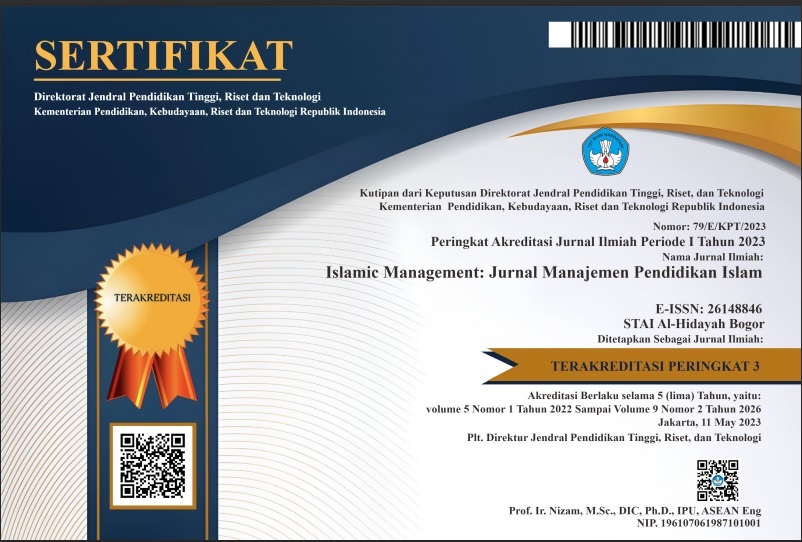IMPROVING LEARNING QUALITY AND STUDENT NUMERACY THROUGH DATA DRIVEN PLANNING AT SMAIT MA'HAD RABBANI
DOI:
https://doi.org/10.30868/im.v8i01.7713Keywords:
Learning quality, Student numeracy, Data-driven planningAbstract
This study aims to improve the quality of learning and numeracy skills of students through the implementation of data-based planning at SMAIT Ma'had Rabbani Central Bengkulu. This study uses an action research design by referring to a framework consisting of four main steps, namely Identification, Reflection, Improve Planning, and Improve Implementation. This data-driven planning strategy is designed to support more effective decision-making in an effort to improve academic performance. The results showed significant improvements in various indicators. The quality of learning increased by 11.97% compared to 2023, with the achievement reaching 68.69 in 2024. Student numeracy also recorded a remarkable improvement of 50.88%, with the score reaching 86.36 in 2024, making it the best indicator.
References
Darling-Hammond, L., Hyler, M. E., & Gardner, M. (2020). Effective Teacher Professional Development. Learning Policy Institute.
Datnow, A., & Park, V. (2019). Data-Driven Leadership. Wiley.
Fullan, M. (2016). The New Meaning of Educational Change. Teachers College Press.
Kementerian Pendidikan, Kebudayaan, Riset, dan Teknologi. (2021). Pedoman Perencanaan Berbasis Data. Jakarta: Kemendikbudristek.
Kemendikbudristek RI. (2022). Panduan Implementasi Kurikulum Merdeka. Jakarta: Kemendikbudristek.
Marsh, J. A., Pane, J. F., & Hamilton, L. S. (2018). Making Sense of Data-Driven Decision Making in Education. RAND Corporation.
Sasongoko, Rambat Nur. 2022. Inovasi Pengelolaan Pendidikan untuk Pengembangan Sekolah Unggul. Bogor: Halaman Moeka Publishing
Susilawati, E. 2024. Meningkatkan Keterlibatan Masyarakat Siswa Melalui Literasi Digital. Kebijaksanaan Lokal Pancasila, Sejarah, dan Kebudayaan Nasional, 19.
Sumaryanta, dkk (2021). Penilaian KBTT: Training of Trainer (TOT) Pelatihan Keterampilan Berpikir Tingkat Tinggi (KBTT) dalam Pembelajaran Matematika Berorientasi PISA. Yogyakarta: PPPPTK Matematika
Downloads
Published
How to Cite
Issue
Section
Citation Check
License
Copyright (c) 2025 Wahyudi Putra, Syamsir Syamsir, Sujirman Sujirman, Lukman Asha, Jumira Warlizasusi

This work is licensed under a Creative Commons Attribution-ShareAlike 4.0 International License.
Authors who publish with this journal agree to the following terms:
- Authors retain copyright and grant the journal right of first publication with the work simultaneously licensed under a Creative Commons Attribution License that allows others to share the work with an acknowledgment of the work's authorship and initial publication in this journal.
- Authors are able to enter into separate, additional contractual arrangements for the non-exclusive distribution of the journal's published version of the work (e.g., post it to an institutional repository or publish it in a book), with an acknowledgment of its initial publication in this journal.
- Authors are permitted and encouraged to post their work online (e.g., in institutional repositories or on their website) prior to and during the submission process, as it can lead to productive exchanges, as well as earlier and greater citation of published work (See The Effect of Open Access).






